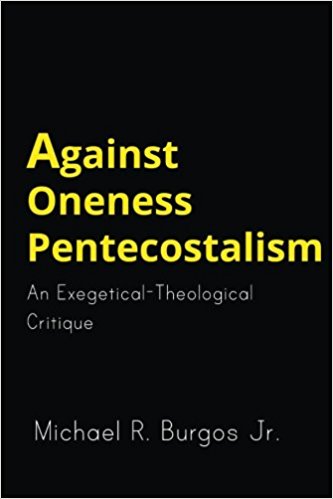When a church affiliated with the United Pentecostal Church rented a storefront in my small hometown in Montana, I spent several days researching and writing an in depth polemic against the sub-christian sect and shared it on my Facebook page. Nothing but a pdf of several dozen pages, the work represented an extensive (for me) but minimalist (over-all) approach to warning the Christian community about the Oneness beliefs of the UPC and their denial of the Holy Trinity.
What Michael Burgos Jr. has produced in Against Oneness Pentecostalism is a helpful book for pastors or churchmen needing a polemical approach against the anti-Trinitarians embedded in our communities and occasionally, our churches.
At 187 pages, with 150 dedicated to the topic itself (other pages include a lengthy bibliography and index of biblical texts), Against Oneness Pentecostalism is – as the subtitle suggests – an exegetical and theological critique of the movement.
Burgos begins with carefully defining terms necessary for theological discussion, including terms like Trinity, Unitarianism, Person, Monotheism, and so forth. As I read the definitions it struck my mind that had such careful attention to terminology at the now-infamous Elephant Room, modalist TD Jakes would not have been so quickly-affirmed by our undiscerning brethren. Burgos would make no such mistake.
Against All Heresies then goes on to explain the relationship of monotheism to Scriptural evidence of God the Son being the Creator and outlining Scripturally His agency in creation. Burgos does this in order to demonstrate that God the Son “existed not as an idealized entity within the mind of God, or as God’s reason, logic or plan…[but rather that] the Son existed as a conscious person who was co-existent with God the Father previous to the Incarnation.”
Then, Burgos goes on to tackle the often misunderstood Texts commonly cited in defense (or in opposition) of the Modalist/Sabellian heresy. These include Genesis 1:26, Isaiah 9:6, Matthew 28:19, John 1:18, John 17:3, Romans 8:3, Galatians 4:4-6, Philippians 2:5-11, 1 Timothy 3:16, and Hebrews 10:5. This section is the bulk of the treatise, and would be very valuable to a pastor or layman trying to use the Scripture to reject the notion of Godhead without three distinct, co-eternal persons.
Of particular interest might by an appendix added, which asks the question whether or not Oneness Pentecostalism is a cult. I won’t ruin the book for you, but Burgos actually goes to great length to answer the question fairly and objectively (but the answer rhymes with “yes”).
You can find the book here.











